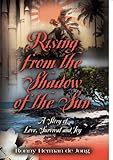 Today, we feature a sneak peek of Ronny Herman de Jong’s historical memoir, Rising from the Shadow of the Sun.
Today, we feature a sneak peek of Ronny Herman de Jong’s historical memoir, Rising from the Shadow of the Sun.
This is the inspiring story of a little girl, a Prisoner of the Japanese in WW II on Java, who makes her dreams come true by determination, faith and love. A historical account of the horrors of life in a Japanese prison camp for women and children followed by Ronny’s memoir of life after the war in Indonesia, the Netherlands and the USA make it a testimony to the resilience of the human spirit.
Rising from the Shadow of the Sun is available through Amazon.com, Amazon UK, Barnes & Noble and other online book stores.
Here is an excerpt from Rising from the Shadow of the Sun:
Part One
Eluding Death
Sticking his bayonet through the gedèk (bamboo fence), the Japanese soldier aimed to kill me. He missed. A little girl with blond braids, I was only five years old in March of 1944. The bayonet sliced through the air over my head. “Mamma!” I cried. “Ronny, come here!” cried Mamma. Dropping my flowers I scrambled across the slokan (ditch) and into Mamma’s arms. “Oh Ron!” said Mamma. “I am so glad you could run so fast through the slokan! You’re such a big girl!” “What was that, Mamma?” “You probably came too close to the gedèk. On the other side is a soldier. He thought you were running away and put a stick through the gedèk to scare you.” “Can you get my flowers, Mam? They are for you.” Mamma took my hand. “We will get them later, when the soldier is gone. All right?”
That morning, Mamma and I were walking along the edge of the camp. I was picking wildflowers for Mamma across the slokan. On the other side of the gedèk, a Japanese guard heard voices and intended to kill me. It is one of the bad memories I have of those three and a half years in Japanese concentration camps. At that time, Mamma, my little sister Paula and I were incarcerated in Halmahera, a Japanese concentration camp outside of Semarang, on the island of Java in the Dutch East Indies. The war had gone on for two years. The Japanese Army had conquered our island in March of 1942. Civilians—men, women and children—were put into concentration camps. Our captors withheld food and medication and treated the prisoners in the most inhumane way. Many were tortured and raped and beheaded. The Imperial Japanese Army’s instructions were to exterminate the Western Race in the islands at all costs so Japan could achieve a monopoly in Southeast Asia.
It was a near miss. I did not die at the hands of that Japanese soldier in 1944 because I was too small. I could have died a year later from hunger edema. In August of 1945, I was six. My legs were like sticks, my tummy was bloated and my cheeks were puffy. I was in the last stages of beri-beri, hunger edema. Paula, then four years old, had dry edema and was a mere skeleton. She could not walk or sit anymore. I imagined how it would happen. Paula would die first. Mamma had “wet” edema, like me, and she would die soon after Paula. I would have a month, perhaps two, before it was my turn. The Japanese would throw me into a mass grave outside the camp; a large hole in the ground dug especially for this purpose. When the war was over, allied rescue troops would unearth my body with all the others and bury it properly in the cemetery outside of town. They would top my grave with a nameless white cross.
